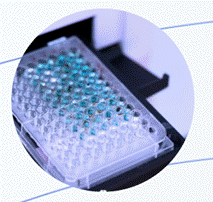Drug Metabolism and
Pharmacokinetics (DMPK) is crucial for biologic therapeutics. With biologics
like monoclonal antibodies and peptides taking center stage in drug
development, understanding their DMPK profiles is paramount. DMPK plays a vital
role in elucidating the absorption, distribution, metabolism, and excretion
(ADME) characteristics of these complex molecules. By tailoring DMPK
strategies, researchers can overcome developmental challenges associated with
biologics. These studies not only address pharmacokinetic hurdles but also
mitigate the risk of immunogenicity. Unraveling these facets is pivotal,
enabling more effective biologic therapeutics to enter the market successfully.
Moreover, the integration of innovative techniques further refines these
processes, contributing to the optimization of biologic therapeutics.
Understanding DMPK in Biologic
Therapeutics
The realm of biologic therapeutics
poses unique challenges, distinct from traditional small-molecule drugs.
Comprising larger, more complex structures, biologics exhibit distinctive ADME
properties that necessitate specialized study approaches. Investigating these
properties requires a detailed understanding of the biological systems they
interact with. Consequently, dmpk studies in this field become instrumental
in the exploration and application of these therapeutic agents. Biologics face
distinct challenges in terms of their metabolism and excretion, impacting their
therapeutic efficacy and safety profiles. These necessitate an exhaustive
analysis of their pharmacokinetic behaviors before clinical development is
undertaken.

Unique ADME Challenges in Biologics
Biologics, due to their size and
complexity, encounter unique ADME challenges. Their large molecular size
affects absorption, often requiring administration through injection rather
than oral routes. This physical property also influences distribution, restricting
their ability to permeate cell membranes effectively. Metabolism presents
another challenge, as enzymatic degradation of biologics can be unpredictable.
Unlike small molecules, biologics typically undergo proteolytic cleavage rather
than hepatic metabolism. Excretion processes also differ, with biologics
predominantly cleared via the reticuloendothelial system. Addressing these
challenges is crucial for optimizing the pharmacokinetic profiles of biologic
drugs.
Immunogenicity and Its Impact on PK
Profiles
Immunogenicity, the propensity of
biologic therapies to induce an immune response, significantly impacts their
pharmacokinetic (PK) profiles. Immune reactions can alter the distribution of
biologics, leading to unpredictable dosing outcomes. Furthermore, anti-drug
antibodies (ADAs) may form, neutralizing therapeutic effects and affecting drug
clearance. High immunogenicity can result in rapid elimination from the body,
reducing therapeutic efficacy. Therefore, evaluating and mitigating
immunogenicity is a primary focus of DMPK studies in biologics. Effective
strategies to predict and manage immunogenicity-related issues are pivotal for
improving the success rates of biologic therapeutics.
Innovative Strategies in DMPK
Studies for Biologics
Advanced methodologies in DMPK
studies continue to evolve, offering profound insights into biologic drug
development. Innovative strategies such as bioanalytical techniques and PBPK
modeling play pivotal roles in enhancing our understanding of biologics’
behavior within the body. These methods not only refine ADME assessments but
also enable more accurate dosing predictions. By leveraging cutting-edge
technologies, researchers can obtain detailed biological profiles that support
optimized therapeutic applications for biologics. These advancements are
crucial for overcoming traditional challenges and advancing the scope and
efficacy of biologic therapeutics.
Advanced Bioanalytical Techniques
Bioanalytical techniques are
integral to modern DMPK studies of biologics. Innovations in mass spectrometry
and high-performance liquid chromatography enhance the detection and
quantification of biologic molecules in biological matrices. These techniques
offer heightened sensitivity and specificity, crucial for characterizing
complex biologics. The advent of ligand-binding assays further supports the
analysis of protein therapeutics, enabling precise measurement of
pharmacokinetic parameters. Such technologies not only facilitate detailed
characterization but also empower researchers to predict potential interactions
and stability issues. This precision aids in mitigating risks, fostering more
robust biologic drug development pipelines.
Integration of PBPK Modeling in
Biologic Development
Physiologically Based
Pharmacokinetic (PBPK) modeling represents a transformative approach in
biologic drug development. PBPK models simulate and predict drug disposition by
integrating data on biological processes and molecular characteristics. For
biologics, PBPK modeling addresses complexities like non-linear kinetics and
tissue distribution, offering detailed insights. This approach allows
researchers to explore “what-if” scenarios, guiding dose optimization and risk
assessment. By simulating potential outcomes, PBPK models provide a framework
for understanding how biologics behave under varying conditions, supporting
more informed decision-making throughout the development process.

Case Studies: DMPK Applications in
Biologic Therapeutics
Successfully applied DMPK
strategies have driven remarkable advancements in the biologic therapeutics
field. Diverse applications from oligonucleotide therapeutics to peptide drugs
exemplify how DMPK optimization enhances therapeutic efficacy. By focusing on
real-world case studies, we can better appreciate the benefits of strategic
DMPK applications in overcoming biologics’ inherent challenges and improving
clinical outcomes. These examples highlight the practical integration of DMPK
insights into the larger drug development narrative, underscoring their role in
bringing effective, innovative therapies to patients.
Oligonucleotide Therapeutics:
Metabolic Stability Assessments
Oligonucleotide therapeutics
benefit significantly from DMPK studies, particularly in assessing metabolic
stability. These molecules often encounter rapid degradation by nucleases,
impacting their therapeutic lifespan. Employing DMPK strategies allows researchers
to manipulate chemical structures, enhancing stability without compromising
efficacy. Meticulous metabolism assessments identify vulnerable sites within
the molecule, guiding modifications. Such strategies lead to the development of
more robust oligonucleotide products, delivering sustained therapeutic effects.
Through DMPK-guided optimization, these therapeutics achieve improved
bioavailability and therapeutic performance in clinical settings.
Peptide Drugs: Enhancing
Bioavailability through DMPK Optimization
Peptide drugs confront notable
bioavailability challenges due to enzymatic degradation and limited absorption.
DMPK optimization strategies play a critical role in enhancing their clinical
utility. By utilizing peptidomimetics or chemical modifications, stability
against proteases can be achieved, prolonging half-life. Moreover, strategies
like prodrug formation and lipidation improve cellular uptake and distribution.
Through rigorous DMPK investigations, these interventions substantially elevate
the bioavailability and efficacy of peptide therapeutics. Consequently, DMPK
optimization directly contributes to more successful therapeutic
implementations and patient outcomes.
Conclusion
DMPK
studies are indispensable in the development of biologic therapeutics,
providing deep insights into the ADME and immunogenic characteristics of these
drugs. The intricate challenges posed by biologics demand specialized DMPK
approaches to ensure optimal therapeutic performance. Innovative strategies,
including advanced bioanalytical techniques and PBPK modeling, are enhancing
our capabilities to predict and refine drug behaviors. By focusing on
successful applications in areas like oligonucleotides and peptides, it’s clear
that strategic DMPK interventions foster better drug design and delivery.
Ultimately, incorporating robust DMPK insights into biologic development
promises to propel more efficacious and safer therapies into the clinical
realm, promoting significant advancements in patient care.
